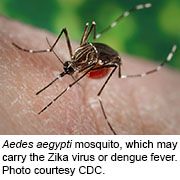Infecting mosquitoes with Wolbachia lowers, inactivates levels of virus in their bodies, saliva
WEDNESDAY, May 4, 2016 (HealthDay News) — Experiments in mosquitoes suggest that bacteria may help curb the spread of the Zika virus, according to research published online May 4 in Cell Host & Microbe.
The researchers got the idea after a pilot program to reduce the transmission of dengue fever showed promise. In the dengue program, Wolbachia bacteria were inserted into the eggs of Aedes mosquitoes. The bacteria were passed from female mosquitoes to their offspring, which significantly reduced dengue virus replication in the insects.
“The idea has been to release Aedes mosquitoes with Wolbachia in the field over a period of a few months, so they mate with Aedes mosquitoes without Wolbachia,” senior author Luciano Moreira, Ph.D., of the Oswaldo Cruz Foundation in Rio de Janeiro, explained in a journal news release. “Zika and dengue belong in the same family of viruses, so with the outbreak in Brazil, the logical idea was to test the mosquitoes carrying Wolbachia by challenging them with Zika virus.”
Mosquitoes with and without the Wolbachia virus were fed human blood infected with two strains of Zika circulating in Brazil, the study authors said. After two weeks, the mosquitoes with Wolbachia had lower levels of Zika virus in their bodies and saliva, and the virus in their saliva was inactive. “Wolbachia showed to be as effective on Zika as the most important dengue experiments we did,” Moreira said.
Copyright © 2016 HealthDay. All rights reserved.








